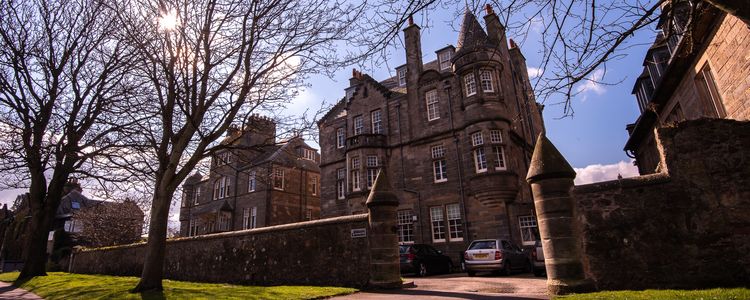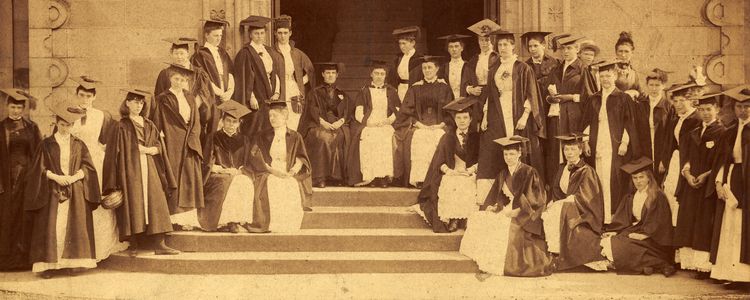About the School of English
The study of English at the University of St Andrews has a long and distinguished history that is sustained in the scholarly, critical, and creative dynamism of today's School of English.

In the present day, the School enjoys an international reputation as a centre for both academic research and literary creativity. The School's richest inheritance, however, is its collegiality: we pride ourselves on our friendliness, and on our common enthusiasm for great literature.
The School of English has a lively research culture, which involves staff, postgraduates and postdoctoral fellows. The school's research work is divided into four groups:
- Medieval and Renaissance literature
- 18th Century, Romantic and Victorian literature
- Modern and Contemporary literature
- Creative Writing.
Facilities
The School is primarily located within Castle House and Kennedy Hall on The Scores, with views of the seafront and the historic St Andrews Castle ruins. Further staff offices and seminar rooms are located in the newly refurbished Beethoven Lodge, located on North Street. The School also provides desk spaces and computing facilities for postgraduate research students in the nearby Old Burgh School.
Kennedy Hall also houses a common room and a kitchen with refreshments which are available to all School of English staff and students.
In addition to the main University library facilities, students also have access to the library's Special Collections, which houses many of the University's rare books.
History
St Andrews was one of the first universities in the world to teach English literature. The University discussed founding a Chair of Eloquence in 1720, in part to educate young Scots in the proper use of the English language. It was thought that the best way to learn 'correct' English was to study 'correct' English texts.
The arrival of Robert Watson as Professor of Logic, Rhetoric and Metaphysics in 1756 brought lectures on rhetoric delivered in English, rather than the traditional Latin. Between 1710 and 1837, the University library had rights to the copyright deposit of all books published in Britain and now holds rare books such as Anna Barbauld's Poems (1773), Percy and Mary Shelley's Journal of a Six Weeks' Tour to the Alps (1816), John Keats's Endymion (1818) and Mary Shelley's Frankenstein (1818). These can still be found in the University's Special Collections division.

In 1877, the great Wordsworthian scholar, William Knight (Chair of Moral Philosophy from 1876 to 1903), helped pioneer one of the first systems of women's university education, the Lady Literate in Arts (LLA), a distance learning scheme which extended around the globe. Knight called for literary, scientific and medical studies to be open to women before they were admitted as full students to British universities. He initiated a commitment to gender equality which the School is proud to uphold today.
The Berry Chair
The Berry Chair was established in 1897 following a bequest made by David Berry in acknowledgement of his brother Alexander’s intention to leave money to the University of St Andrews. Alexander Berry was born in Fife and studied at the University of St Andrews before becoming a ship's doctor, trader and plantation owner. The Berrys' enormous wealth derived from trade in Oceania and, later, from a plantation in Australia. The Berry bequest funded several appointments and other projects in the University, but the Chair in English is the only one to retain the Berry name. The bequest has not formed a distinct part of the University's accounts for several decades and does not directly fund the Chair in English.
Recent holders of the Berry Chair include:
- Professor Lorna Hutson (now Merton Professor of English Literature, Oxford), the distinguished scholar of early modern literature and legal rhetori
- Professor Anne Coldiron (now Emerita, formerly George Matthews Edgar Professor of English at Florida State University), the eminent scholar of Renaissance and late medieval literature.
The School of English is grateful for the guidance of Indigenous Australian scholars in our reconsideration of the Chair's colonial history. Following the School’s work over the last few years researching and reconsidering the complex legacy of the Berry bequest, the decision was taken to emphasise and foster global, transnational, postcolonial, and Indigenous studies in the appointment of a new Chair and to establish this as the broad field of the Chair's work on an ongoing basis. To read more about the history of the Berry Bequest, the School’s acknowledgement of its legacy, and about the new iteration of the Berry Chair, see the forthcoming website.
Strategic Plan
Underpinning the mission and activities of the School, the Strategic Plan 2020-2025 (PDF) outlines School aspirations, aims and commitment to world-leading and inclusive teaching and research.